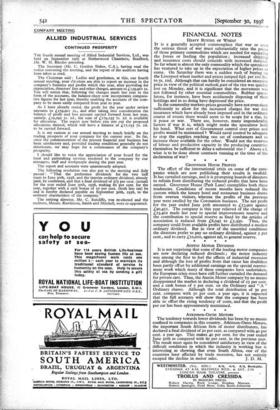FINANCIAL NOTES
HEAVY BUYING OF WHEAT
IT is a generally accepted commonplace that war or even the serious threat of war must substantially raise the prices of those primary commodities which are needed for equipping the forces or feeding the population ; increased shipping and insurance costs should coincide with increased demand. So far wheat is almost the only commodity which the speculator has ventured to take up in the expectation of higher prices to come. On Saturday there was a sudden rush of buying on the Liverpool wheat market and prices jumped 6td. per soo lbs. to 5s. sod. Although that can hardly be considered an excessive price in view of the political outlook, part of the rise was quickly lost on Monday, and it is significant that the movement was not followed by other essential commodities. Rubber specu- lators, for instance, have been assiduously disposing of their holdings and in so doing have depressed the price.
In the commodity markets prices generally have not even risen sufficiently to allow for the increased charges for war risk insurance which have already been imposed and in the ordinary course of events there would seem to be scope for a rise, be it peace or war. There are, however, many imponderable factors if war it is, which might make the speculator hold his hand. What sort of Government control over prices and profits would be maintained ? Would naval control be adequate to stop the supplies reaching one set of combatants and so increase those available for the other. Would not the reserves of labour and productive capacity in the producing countries themselves be sufficient to delay a substantial rise ? Above a 1, what is to be done about contracts running at the time of the declaration of war?
GROSVENOR HOUSE PROFITS The effect of the international crisis on some of the com- panies which are now publishing their results is twofold. It has curtailed earnings, and it is prompting boards of directors to refrain from distributing the reduced profits that have been earned. Grosvenor House (Park Lane) exemplifies both these tendencies. Conditions of recent months have reduced the custom which the luxury hotel and restaurant business draws from oversea visitors, whereas the profits of the previous year were swelled by the Coronation business. The net profit for the year ended June 30th amounted to £53,902 against L90,455. The company is this year relieved of the charge of £23,402 made last year to special improvements reserve and the contribution to special reserve as fixed by the articles of association is reduced from £6,045 to £2,390. Thus, the company could from available profits have distributed a modest ordinary dividend. But in view of the unsettled conditions the directors prefer to pay no ordinary dividend, against 5 per cent., and to carry £xo,000, against nil, to general reserve. * * * *
AUSTIN MOTOR DIVIDEND
It is not surprising that some of the leading motor companies are now declaring reduced dividends ; the motor industry was among the first to feel the effects of industrial recession and although the loss of profits from that cause has doubtless been partly offset by additional earnings on the special rearma- ment work which many of these companies have undertaken, the European crisis must have still further curtailed the demand for private cars. Thus, the Austin Motor company by no means disappointed the market in declaring a dividend of 25 per cent. and a cash bonus of 5 per cent. on the Ordinary and " A " Ordinary shares. Although the total distribution of 3o per cent. compares with 5o per cent. a year ago, it is expected that the full accounts will show that the company has been able to offset the rising tendency of costs, and that the profit per car has been approximately maintained.
* * * *
ATKINSON-OATES MOTORS
The tendency towards lower dividends has been by no means confined to companies in this country. Atkinson-Oates Motors, the important South African firm of motor distributors, has declared a final dividend of zo per cent. as compared with 4o per cent. a year ago. This makes 4o per cent. for the year ended June 30th as compared with 6o per cent. in the previous year. The result must again be considered satisfactory in view of the difficult conditions in which the industry is working but is interesting as showing that even South Africa, one of the countries least affected by trade recession, has not entirely
escaped the decline in motor sales. J. D. M.














































 Previous page
Previous page